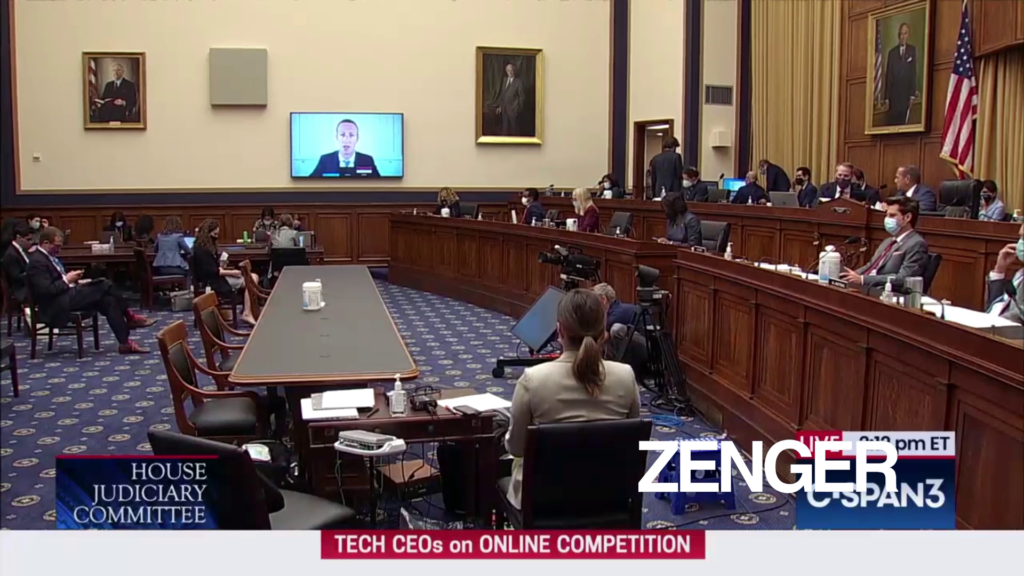The hostility toward Big Tech was on display from both Democrats and Republicans during last week’s antitrust hearing.
And despite expectations, lawmakers on both sides of the aisle had thoroughly prepared.
“It was not a great day for the tech companies,” said Paul Gallant, an industry analyst at Cowen & Co. “[Lawmakers] were remarkably well-versed and prepared on antitrust law and the specifics of these companies. … I think everyone went into this hearing with the expectation that Congress would be ineffective.”
For nearly six hours on Wednesday, lawmakers on the House Judiciary Committee’s antitrust subcommittee questioned Amazon’s Jeff Bezos, Apple’s Tim Cook, Facebook’s Mark Zuckerberg and Google’s Sundar Pichai on how the tech giants have allegedly used their market power to squash their competition. Lawmakers used documents and internal messages from the executives to make their points.
The best case scenario for the four companies after this hearing would be that no lawsuits are filed and Congress doesn’t pass legislation that would make it easier to sue the companies, said Gallant.
The animus toward the companies was bipartisan, but the reasons were not. Democrats grilled the leaders of Amazon, Apple, Facebook and Google on their alleged anticompetitive practices while Republicans focused on the companies’ alleged anti-conservative bias and censorship, which was unrelated to the yearlong investigation leading up to the hearing.
What happens next could have big implications for the tech giants. Democratic Rep. David Cicilline of Rhode Island ended Wednesday’s hearing by saying some companies need to be broken up.
Bruce Abramson, a lawyer, cast doubt on whether the law is broad enough to address the advances in the tech industry. The real problem, he said, is that the laws and regulations governing the industry were developed decades ago.
“We now have a technology that is dominated by a small number of the world’s largest companies. First of all, they found loopholes. Second of all, they’re operating in a very different environment,” Abramson said.
“One of the purposes of antitrust law — this is one that I think legislators do get — is to prevent large companies in any field from destroying their up-and-coming competitors. That is not functioning in the tech sector,” he, said. “The handful of tech giants are very well positioned to squelch any next-generation [competitor].”
Ultimately, Abramson noted, Congress doesn’t enforce federal antitrust laws. The Federal Trade Commission and U.S. Department of Justice enforce them.
And while lawmakers drew praise for their understanding of the law underpinning the issues, some seemed at times confused about how the technology works.
Republican Rep. Greg Steube of Florida spent several minutes asking Google CEO Sundar Pichai why his campaign emails were ending up in his father’s spam folder in Gmail. Steube asked whether the email service was biased against Republicans because he hadn’t heard of the same thing happening to Democrats.
Democratic Rep. Val Demmings of Florida said she has also heard complaints of her campaign’s emails ending up in spam folders.
Republican Rep. Jim Sensenbrenner of Wisconsin confused Facebook for Twitter. Sensenbrenner asked Facebook’s Mark Zuckerberg about the suspension of Donald Trump Jr.’s account for sharing misinformation about the coronavirus.
“Congressman,” Zuckerberg said, “What you might be referring to happened on Twitter. So it’s hard for me to speak to that.”
(Edited by Allison Elyse Gualtieri.)
The post Congress presses Big Tech on competition appeared first on Zenger News.

